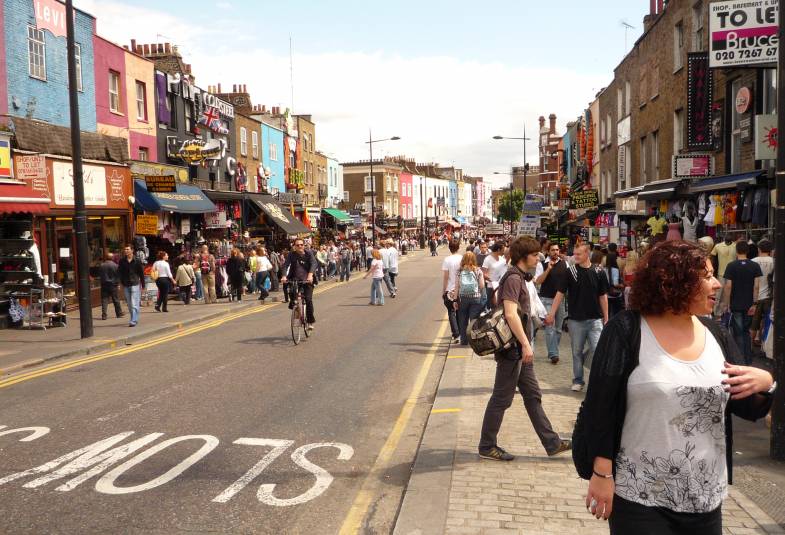
What's inhibiting our freedom?: The apostolic life to which Jesus Christ is calling us and for which he has set us free
By the Rt Revd Dr Martin Warner, Bishop of Chichester
We liked Egypt
The phrase ‘setting God’s people free’ opens a profound scriptural history, as we know. It is intimately related to the paschal mystery of Easter and the life of a people who have died with Christ in order to live in the freedom of his risen life.
There is also, however, an entirely human instinct in our life as the household of faith – the Church. We don’t necessarily want to be set free from what is familiar and comforting. In the wider, social context of disturbing uncertainty and increasing hostility to Christian faith, we are perhaps understandably more inclined to prefer church life as we know it.
This response is not unscriptural. ‘The whole congregation of the Israelites complained against Moses and Aaron in the wilderness. The Israelites said to them, “If only we had died by the hand of the Lord in the land of Egypt, when we sat by the fleshpots and ate our fill of bread”’ (Exodus 16:2). When the initial euphoria wore off, being set free did not look so attractive. By contrast, there are many signs within the life of the Church of England that indicate the confidence and courage to embrace the challenge of apostolic life in a changing environment, responding to the injunction of the risen Lord: ‘Go therefore and make disciples’ (Matthew 27:19).
The Diocese of Chichester covers a largely rural area, dominated by the South Downs, together with urban areas spread along the coast and clustered around Gatwick airport. There is much affluence and, alongside it, unacceptable and historic patterns of deprivation. We face challenge and change like many other parts of the UK.
I’ve been visiting deaneries to hear from lay people and clergy what inhibits their freedom, and what encourages their apostolic life. The talk has been led by laity and the evidence has been very honest and overwhelmingly positive.
From my visits there are three themes relating to Setting God’s People Free that I think are worth sharing. They are time, boredom and exclusion.

Time
Misuse of time
Like the impression that there is a widening gap between concentrations of wealth and of poverty, so also with time. Many people don’t have enough time, driven by competitive markets and career ambition. Many don’t know how to fill the empty hours of the day, living in a retirement that can be isolating, or in work that is degrading in its conditions and levels of pay. Against this backdrop, we must ask questions about how commitment to prayer, witness and outreach uses the precious gift of time.
There seems to be overwhelming evidence that congregations feel burdened by bureaucracy. This is not a complaint against vital safeguarding training or effective management of finance and HR. It is just difficult to recruit people who are willing to take on responsibilities that will consume their life.
We must guard against seeking to set God’s people free so that they can undertake administrative functions which virtually extinguish the spirit of joy and imagination in Christian life. I do meet people who have had that done to them. And just as the impression of living a joyless, burnt-out life must never be equated with the virtue of sacrifice in ordained ministry, so also it must never be equated with “real commitment” in the lay apostolate.
In contrast with demands that can damage the joy and freedom of life in Christ, Scripture offers a different account of encounter with God. ‘O that today you would listen to his voice,’ says the psalmist in Psalm 95. This sense of something revelatory and transformative happening in time, right now, is echoed by Jesus at the start of his public ministry. Luke records that while at worship in the synagogue in Galilee, on the Sabbath, Jesus says of a prophecy in Isaiah: ‘Today this scripture has been fulfilled in your hearing’ (Luke 4:21).
Worship and time are God’s gifts and instruments for setting people free.
Redeeming time
The worship of God liberates us and gives us dignity. Freedom to serve the Lord is the reason for leaving behind slavery in Egypt. The question of time is not about duration – how long the service lasts – though that can be another damaging demand on people’s time. Much more profoundly, worship must be an exercise in which we rehearse how to sanctify time.
I have been very moved by the importance of time in the introduction to the monastic services used by the Benedictine order. The time-consuming practicalities of community life are sorted out so that one thing has priority: the ‘Work of God’ – prayer and worship.
People with demanding secular jobs, family responsibilities and other commitments that belong to the calling to be a lay Christian must not think that a monastic life is more Christian than the life they live. Monastic vocation is an unusual and distinctive Christian lifestyle that beautifully explores the demands and lessons which are in some way important for the whole Church.
The introduction to the Work of God reads:
The hours of the Work of God are not spaces carved out from cosmic time (that which the Greeks called chronos) but special times that, through worship, become moments of salvation history (i.e. kairos), enabling us to encounter God.
How important it is for the worship in our churches to transport us into the kairos time of salvation history. We need to be very attentive to what worship feels like for anyone who is in the place where it is happening. We should expect that worship will fascinate, startle, challenge, delight and humble us, because in this momentous action something is being fulfilled in us and, through us, in the world at large.
The diversity of our traditions of worship will apprehend this sense of fulfilment differently. In the Eucharistic tradition of the Church of England, the obvious point at which we encounter kairos time is in the recognition and adoration of the presence of Jesus in the words of Scripture and the breaking of bread. The words ‘this is my body’ define the intersection of time and eternity, as we recognise his body in bread which was our gift and will change us physically and spiritually as we eat of it.
Worship should transform our sense of the timeframe within which we live. The hours that are costed for the consultant, lawyer, or on the parking meter, must not determine who you are – because those are the hours that have an end and a terminus that we call death.
The worship of God should have the capacity to absorb us completely, not as spectators but as those who constitute the Church in the enactment of the eternal mysteries of our faith. It must transcend the ticking of the clock, in an action that affects transformation in our material world. If it does not, there is a chance that it has sunk into a human parody of something sacred.

Boredom
In the context of anxiety about change, there is a danger that we lose our capacity for attention to God and develop instead a nervous excitement about being busy. Unfortunately, without the wisdom of attention to the kairos dimension of our lives, our busyness results in noisy tinkering with the ‘chronic’ aspects of ecclesiastical life. We become introspective and church-bound.
This is profoundly boring, especially for people who do not yet know God’s love for them. They are not very interested in our chronic busyness. The agenda of virtually any synod simply doesn’t offer much to attract their attention.
By contrast, the working life of the people of God who are the laity is, I find, exceptionally interesting, in so many of its dimensions.
David Wilkinson, a theologian and physicist, came to talk to us in Chichester about astrophysics in relation to the creation narrative of Genesis. Far from being a fundamentalist stand-off between faith and science, he gave us a fascinating demonstration of the close relationship between the two. ‘Why,’ he asked, ‘do we never pray for more Christian scientists, in the way we might pray for more missionaries, teachers or priests?’
Those who work in finance, whether in high street banks, investment, compliance, or pensions, have profoundly important things to teach us about the need for a holiness code that regulates greed, honesty and accountability. But no less important is the person who delivers the post and knows the streets and the local community inside out, or the person who reads gas meters and has an instinct for speaking to people who are feeling uneasy about something important, such as the love of God.
Teachers and NHS employees obviously come close to the stories of the Gospel, as do lawyers and politicians. But I also want to hear about computer technology and Artificial Intelligence, and be challenged to assess how it might connect with the wisdom literature of the Old Testament, and what the early Christian thinkers would make of it as an element in the ranks of the ‘powers and dominions’ of this world that are to be made subject to the lordship of Jesus Christ.
The people of God deserve to be set free from the dominance of chronic discussions about mundane regulation, in order to engage with the wisdom of God which is the standard to which we are accountable in our daily work and the stewardship of creation. They should expect to be nurtured and encouraged in the task of drawing from the deep well of divine wisdom and making it their own.
Nor is this a self-regarding exercise like going on a diet because it will make you feel better about how you look. This is about the deeper health of our Christian witness and mission. The theologian and the financier, the postal worker, teacher, surgeon and the scientist, should be in a dialogue that is constantly finding new ways to shape a compelling and urgent apologetic for faith today in God and God’s revelation in Jesus Christ.

Exclusion
One of the mission initiatives that the Church of England has rather bungled is the admission of children to holy communion prior to confirmation.
This does not necessarily imply that we have excluded children from church. But we have given them an experience of church that withholds access to its most sacred and profound experience of dramatic encounter with Jesus Christ.
One of the privileges of meeting young people who are about to be confirmed is that I get to hear about their story of faith. I note how seriously they have thought about their faith, but also what thin teaching they generally get, and how much learning has been left to chance. That needs to be addressed if the people of God, in the whole of its age range, is to be set free by teaching in the Lord’s own style – with compelling attraction, compassion and at some length.
Just as the working life of the people of God seems to be remarkably absent from how we form our apologetic account of faith today, so also the faith of children is rarely recognised as a source of instruction for the whole Christian community and for our witness to today’s society.
We find it easy to be delighted that the Sunday school children have made crowns for the festival of Christ the King. But when a young teenager says to me, prior to confirmation, ‘My search for God helps me understand death’, I feel there are more profound lessons to be learned from their age group.
This impression is reinforced in the process of administering holy communion, when one so often witnesses a capacity for deep reverence and wonder in young communicants that is markedly and distressingly absent in the attitude of many adults.
Conclusion
Fear is what imprisons us; love is what sets us free. My hope and prayer is that in our use of time, in our worship, in our work and in our children, we will nurture an openness to using God’s gifts in the apostolic life to which Jesus Christ is calling us and for which he has set us free.







